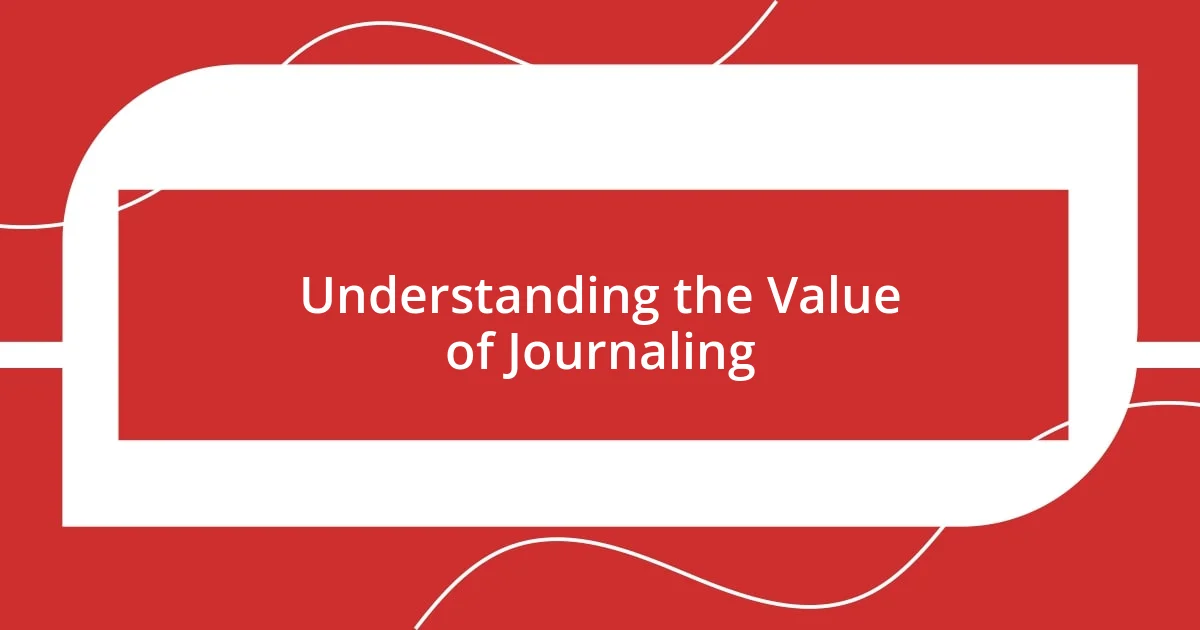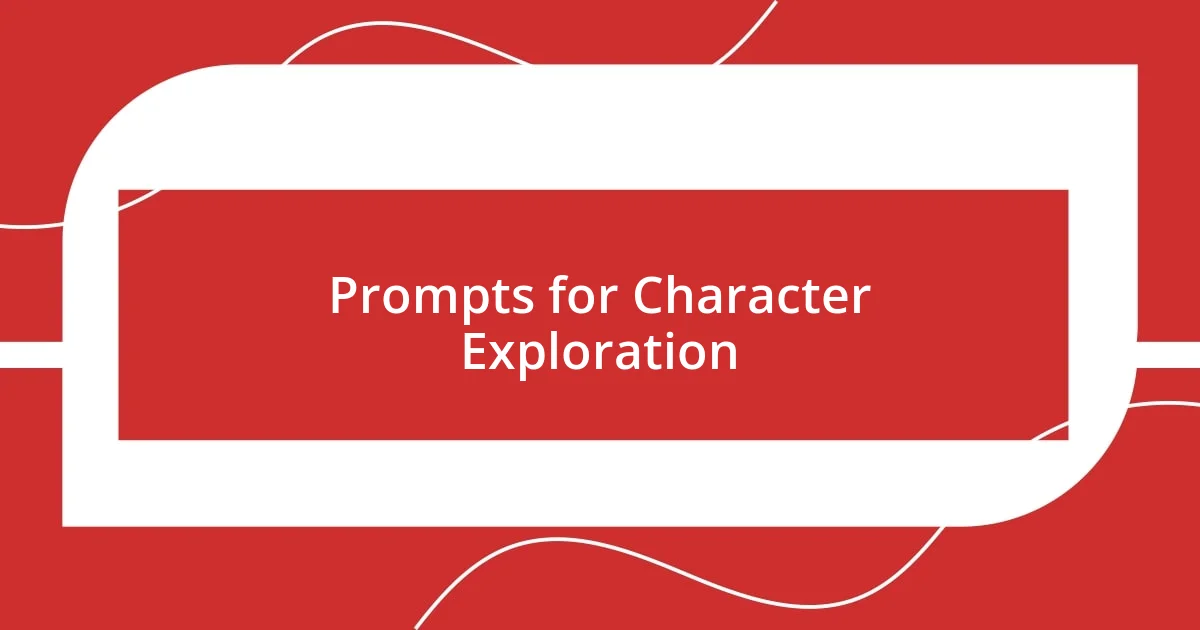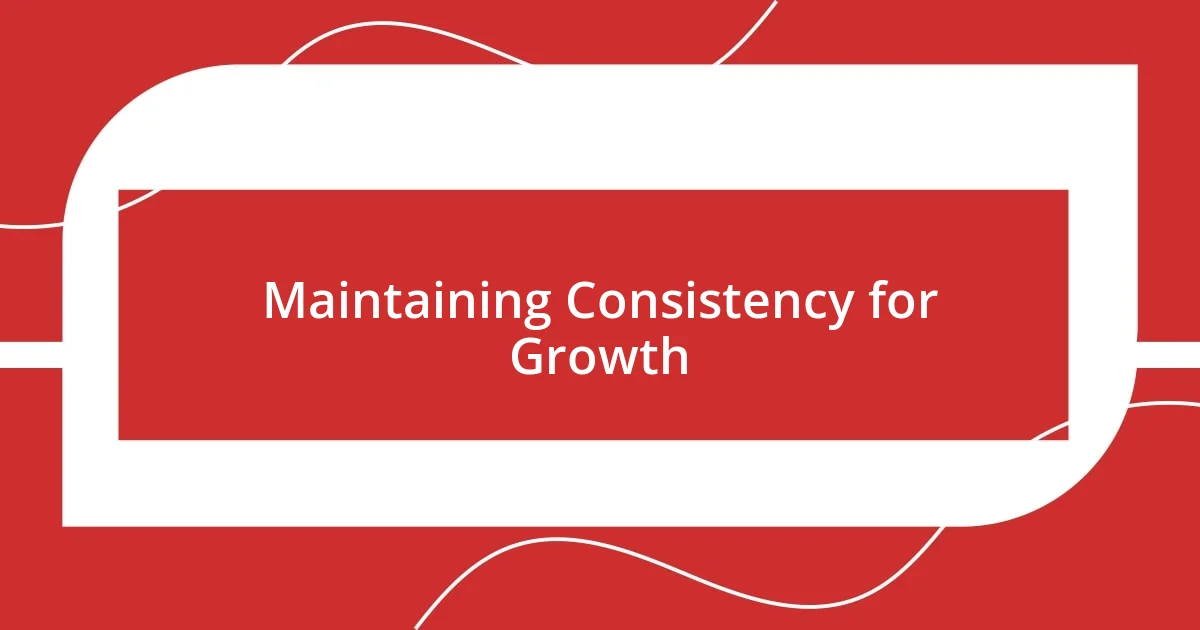Key takeaways:
- Journaling facilitates emotional clarity and self-discovery, revealing insights about personal character traits and motivations.
- Establishing a personalized journaling routine with prompts and formats enhances creativity and allows for deeper exploration of character development.
- Integrating insights from journaling into writing enriches character arcs and storytelling, revealing profound connections between characters and their choices.

Understanding the Value of Journaling
Journaling has always been a compass for my thoughts, guiding me through the maze of emotions and experiences. I recall a period when I felt lost creatively; pouring my feelings onto the page helped me articulate what I could not express verbally. Isn’t it intriguing how a simple act of writing can pave the way for clarity and understanding?
When I look back at my journal entries, I often discover layers of character traits that I hadn’t fully recognized. For example, during a challenging project at work, I wrote about my frustrations, only to realize how my perfectionism was stifling my progress. Have you ever paused to reflect on your own writing and found insights that opened your eyes to aspects of yourself you hadn’t considered?
The beauty of journaling lies in its ability to capture fleeting thoughts that might vanish if not documented. I often find that after a long day, scribbling down my experiences not only gives me a sense of closure but also sheds light on my emotional responses to various situations. It’s like holding a mirror to my soul—what might you discover if you did the same?

Setting Up Your Journaling Practice
Setting up your journaling practice is a personal journey, tailored to your unique style. I started with a small, dedicated notebook, one that felt good in my hands, and it made a significant difference. Choosing a comfortable space to write also plays a crucial role; I found sitting by a window, with sunlight pouring in, sparks my creativity and openness.
Establishing a consistent routine can also enhance your practice. Initially, I struggled with writing daily, often feeling pressured to produce meaningful content. However, I learned to give myself permission to write anything, from the mundane to the profound. This shift allowed my journaling to become a natural extension of my day, rather than a chore.
Creating prompts that resonate with you can be incredibly helpful. For instance, I often ask myself reflective questions such as, “What was the highlight of my day?” or “How did I handle a particular challenge?” These prompts serve as a guide, making it easier to dive deep into my thoughts and emotions. What prompts excite you, and how would they enrich your writing experience?
| Aspect | Example |
|---|---|
| Journaling Space | Cozy corner by the window |
| Routine | Writing every evening after tea |
| Prompts | “What inspired me today?” |

Choosing the Right Journaling Format
Choosing the right journaling format can profoundly influence your practice and the insights you gather from it. Personally, I have explored various formats, from traditional handwritten notebooks to digital apps, each revealing different dimensions of my thoughts. I remember experimenting with bullet journaling and found the structure both freeing and limiting; the rigid format challenged my creativity, while the simplicity helped me streamline my reflections.
Here are some formats I’ve tried, each with their unique benefits:
- Handwritten Journals: Connects me to my thoughts in a tactile way; feels personal.
- Digital Apps: Provides convenience and searchable entries, perfect for those on the go.
- Bullet Journaling: Helps organize my thoughts visually; encourages creativity with layouts.
- Voice Journals: Captures raw emotions instantly; a spoken reflection adds a layer of authenticity.
Selecting a format that resonates with you enhances the emotional depth of your journaling experience. I had once switched to a voice recording app during a particularly stressful week, and it allowed me to express feelings more freely than writing ever could. The rawness of my voice captured nuances that my handwriting sometimes missed, giving me valuable character insights I hadn’t expected.

Prompts for Character Exploration
Exploring character through journaling can be incredibly rewarding, especially when using targeted prompts. I often turn to questions like, “What does my character fear the most?” or “What does a perfect day look like for them?” These prompts not only serve as gateways into their psyche but also allow me to reflect on how their experiences shape their decisions. Have you ever thought about how your character’s fears can drive their actions? It’s fascinating to witness these connections unfold on the page.
Sometimes, I like to spice things up with imaginative scenarios. For instance, I might ask, “How would my character react if they suddenly won the lottery?” This allows me to explore their values and desires in a context that challenges their norms. When I did this with a character I’ve been developing, I realized they valued companionship over wealth, which opened up new avenues for conflict and character growth. What scenarios intrigue you, and how might they deepen your understanding of your characters?
Another effective method I use involves sensory prompts. Writing about what my character smells, hears, or feels can reveal so much about their world. I once wrote about a character remembering the scent of fresh pine while hiking, and it conjured a wave of nostalgia that unexpectedly unveiled their backstory of loss and healing. Isn’t it incredible how sensory details can breathe life into your characters? Digging into these layers can transform your understanding of what makes them tick.

Analyzing and Reflecting on Entries
Reflecting on my journaling entries often leads to surprising discoveries about my characters. I recall a particularly poignant session where I revisited an entry about a conflict my character faced. As I dug deeper into my thoughts, I realized that the underlying fear driving their actions mirrored some of my own insecurities. This revelation helped me understand my character on a more intimate level, adding layers to their emotional journey. Have you ever experienced a moment like that where your character’s struggles resonated with your own?
As I revisit past entries, I also look for common themes that emerge over time. One character I worked on repeatedly faced issues surrounding trust, which I had initially overlooked. Analyzing my thoughts revealed that these recurring phrases reflected broader emotional struggles throughout their arc. I found it helpful to highlight these patterns, as they not only clarified my character’s motivations but also guided their development in my story. How often do you take the time to spot these connections in your own writing?
Engaging in reflective journaling allows me to pose questions after analyzing my entries. For instance, I might ask, “What does this reveal about their motivations?” or “How does their past influence their present actions?” I remember one particularly immersive session where I discovered that a seemingly trivial event in my character’s history deeply impacted their relationships. Realizing that moment’s significance illuminated a core conflict in their story, enhancing the depth of their character arc. It truly is eye-opening to explore these insights—what breakthroughs might you find if you delve into your entries?

Integrating Insights into Your Writing
Integrating insights into my writing often starts with weaving learned details directly into character interactions. For instance, after journaling about a character’s upbringing, I found that their ways of expressing love were deeply influenced by their childhood environment. When I wrote a scene where they navigated a complicated relationship, I could subtly incorporate those nuances, which added a layer of authenticity to the dialogue. Have you ever noticed how applying such insights can transform a simple exchange into something genuinely profound?
Another technique I embrace is to reflect my characters’ emotional arcs through their choices in pivotal scenes. I once journaled about a moment when my character faced a moral dilemma, revealing their fear of abandonment. By integrating this insight into a climactic decision point, the tension captured their internal struggle and made the stakes so much higher. Isn’t it exhilarating to see how character depth can elevate a plot?
Lastly, I love to use these insights as a springboard for symbolism throughout my narratives. After exploring a character’s obsession with collecting vintage cameras, I was inspired to let those cameras symbolize their desire to capture fleeting moments and perhaps prevent loss. This motif not only enhanced the storytelling but made their eventual realization about letting go all the more impactful. What symbols have you found that resonate deeply with your characters’ journeys?

Maintaining Consistency for Growth
Consistency is truly the backbone of any practice, including journaling for character insights. I’ve learned that setting aside dedicated time each week transforms my writing sessions into enlightening rituals. There’s something exhilarating about knowing I have a safe space to explore my characters consistently. How does that regularity impact your own creative process?
One of my favorite routines is to dedicate Sunday afternoons to reflect on my weekly journaling entries. It’s fascinating how recurring thoughts often surface when I commit to this rhythm. In one instance, I noticed a character’s tendency to retreat during moments of conflict mirrored my own inclination to avoid confrontation. This revelation opened up a whole new chapter of growth for both my character and myself. Have you ever stumbled upon a similar connection while looking back over time?
Another layer of growth comes from tracking my characters’ evolution in a journal dedicated solely to their development. By revisiting their defining moments consistently, I can weave their journey seamlessly into the narrative. For example, I recently recorded how a character’s struggles with accountability transformed as they embraced responsibility. Observing that shift over time not only enriched their arc but inspired me to take accountability in my own life. How do you keep track of your characters’ growth?















